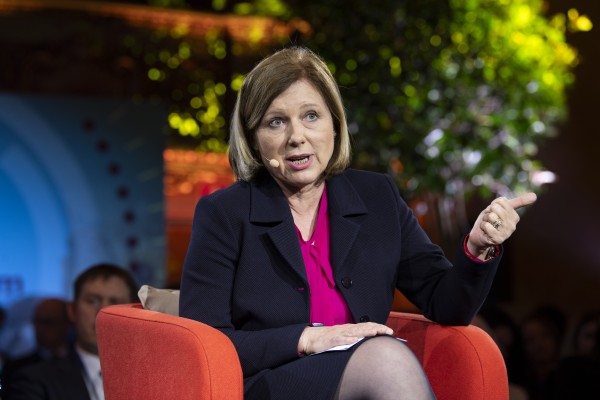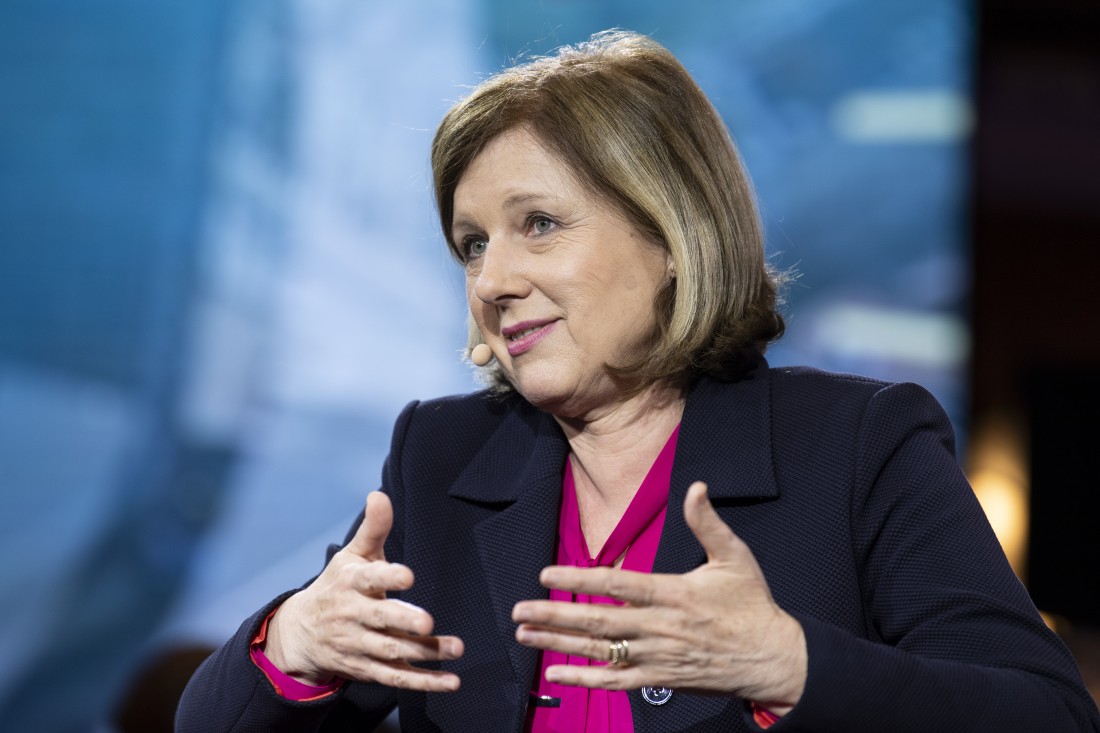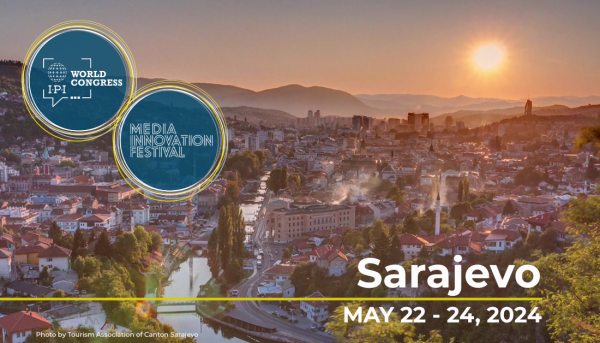Over the past five years, Věra Jourová, Vice-President of the European Commission for Values and Transparency, has been leading the Commission’s efforts to strengthen media freedom under its Democracy Action Plan.
This has resulted in an unprecedented array of legislative initiatives through the completion of the European Media Freedom Act, the Anti-SLAPP Directive, the issuing of recommendations for the safety of journalists, the implementation of the Digital Services Act and the roll out of the Rule of Law mechanism monitoring media pluralism.
It has also seen the commission take on a more proactive role in challenging governments on their records and issuing infringement proceedings against member states when EU law may have been transgressed in the treatment of media.
Jourová has also made safeguarding media freedom part of a very personal mission. She draws on her experience of growing up under communism and the need to face down political movements that seek to undermine democratic values and free speech. She also made a personal pledge to the family of Daphne Caruana Galizia to push through a law, Daphne’s law, to protect Europe’s journalists against vexatious lawsuits.
Vice-President Jourová is currently conducting a “democracy tour” of Member States and we were delighted therefore that she was able to take time out for this interview with IPI’s Executive Director, Frane Maroević, as part of our World Press Freedom Day campaign.
Read the full interview here below.
___________________________________________________________
You have consistently championed freedom of the media during your mandate and leading the legislative agenda under the European Democracy Action Plan. Why was this important and what have you achieved?
It was extremely important for many reasons. First of all, because media freedom is essential to democracy, I am convinced about that. Journalists provide facts and information that people use to make decisions. Journalists keep power in check, they are watchdogs, they are the fourth estate. They investigate and fight corruption.
They have such an important role, yet, when I started this mandate in 2019, I felt this role was not recognised and even less protected at EU level. Having lived under communist regime for more than 30 years, without media freedom, I think I could feel it in my bones that something was going wrong here.
“It is unacceptable and irresponsible when violence is coming from the mouth – or the tweets – of political leaders. […] Journalists need political figures to speak out to defend them when they are attacked.”
Věra Jourová, Vice-President of the European Commission
I wanted to change the situation. And so I met you! I had a series of meetings with media freedom organisations, with brave journalists, with their families, as well as researchers specialised in media policies. In short, great allies.
To understand the work of journalists and the media, and the challenges they are facing. And with all my dedicated colleagues in the Commission, we worked on solutions. We did a lot, more than any Commission had done before, we broke new ground.
The EU adopted two new laws: the Media Freedom Act and a Directive to fight abusive litigation against journalists. Many said it would be impossible to have these laws, but we did it. We have now media freedom as a key pillar of our annual rule of law report – this means we monitor the situation across all Member States.
“It is a David and Goliath fight. And I wanted to help David, and all those who take risks to speak out for the public interest.”
Věra Jourová, Vice-President of the European Commission
The Commission presented concrete recommendations to Member States to improve the safety of journalists. We have also embedded media freedom in other key pieces of legislation, such as the Digital Services Act and the AI Act. And there is still a lot of work ahead with the implementation of these new rules. We also need to do more when it comes to the sustainability of the media sector.
But yes, we have come a long way together to make media freedom higher on the political agenda and have new tools at EU level to protect journalists. Personally this was a promise I made to the family of Daphne Caruana Galizia. And they told me I had fulfilled my promise, so for me this is a great achievement.
What are the principal threats to media freedom in the EU, particularly in the build up to the June elections? Which ones are the EU best placed to address and which ones are not?
I am doing now what I call a “democracy tour”, I visit Member States to discuss the threats to elections and how to address them. I think that Russian interference and disinformation are major threats for our democracies as a whole, including independent media – and this is why the EU is mobilised to address these threats.
The manipulation and lies that are spread by the Kremlin and other malign foreign actors aim to create doubts and undermine trust in democratic institutions – and this also includes undermining trust in independent media.
“Fighting disinformation and promoting media freedom are two sides of the same coin. What we need is more space for information online, and less space for disinformation.”
Věra Jourová, Vice-President of the European Commission
For example, Russian propagandists are good at creating confusion and “fake media” – it looks like a media, but it is a propaganda outlet part of wider Russian network. We saw it recently with the scandal around “Voice of Europe”. This is a threat not only to our values but to our security.
At the same time, the wave of disinformation brings even more work to journalists to check facts and sources. Journalists are in the frontline of the information war. This only strengthens the case for more protection for them.
How do you explain the growth of intolerant political rhetoric towards critical journalism? How can we stop its spread?
I am very worried about the situation. We know too well that verbal attacks can lead to physical violence. And they have a chilling effect.
It is unacceptable and irresponsible when violence is coming from the mouth – or the tweets – of political leaders. I made this clear on many occasions. I think – and I was also told by journalists themselves – that journalists need political figures to speak out to defend them when they are attacked.
In some cases, for example when it comes to illegal hate speech, laws are there to protect journalists. These laws should be applied and justice should be done. Some smear campaigns are more insidious.
We know that women are more targeted than men, this is why we have a dedicated framework at EU level to fight violence against women.
How big a threat is media capture to Europe’s journalism. In particular media capture by political forces that misuse the powers of the state to gain control and influence over the public media and the regulators, and misuse state funds and other tools to undermine critical media while rewarding political allies?
We have been looking at the Media Pluralism Monitor published by the European University Institute to assess how big the risks are. The Monitor has shown a “medium risk” when it comes to the political independence of the media over the past years.
The Monitor states that the political risks to media pluralism – including the politicisation of media ownership and editorial production, and management of public service media – are persistently maintained in a significant number of countries, especially those in Central and Eastern Europe.
What I have seen over the past years is that no country is immune, and this is why I wanted to take action with the Media Freedom Act, to have a safety net at EU level for all countries. With the Act, we will have safeguards at EU level. The law makes it clear that states cannot interfere in editorial decisions and they cannot go after journalists to get their sources.
We also ask EU countries to set in law objective criteria for appointing the managers and governing board of public service media. And we say that financing of public service media should be transparent and predictable. So money cannot be used as a pressure tool to turn public service media into propaganda channels.
“A key focus for me over the next months will be to look at how we can boost investments in the media sector and encourage tech companies to engage with the media.”
Věra Jourová, Vice-President of the European Commission
Media regulators should also be independent. We ask for transparency: transparency of media ownership, transparency and fairness in the allocation of state advertising.
Once the law will apply, as of August 2025, journalists and media will be able to go to court to defend their new rights. The Commission will be able launch infringement procedures on the basis of the Media Freedom Act. And infringements might lead to financial penalties from the European Court of Justice.
A central debate under the EMFA centred around media pluralism and what, if any, limits should be applied to the size of media groups. The central argument to resist limits was that media mergers have become vital for media to survive ever since the online platforms started dominating the advertising market.
What can the EU do to break the stranglehold of the platforms on the advertising markets and ensure revenue is redirected back to media and news providers?
The question around the sustainability of the media sector, and how it can function properly in the online environment, is indeed a very important and complex one.
First, you mention concentrations. There is a clear need to assess the impact of concentrations on media freedom and pluralism, and this is why we have included a so-called “media pluralism test” in the Media Freedom Act.
This test has to take into account several elements, including effects on the formation of public opinion, safeguards for editorial independence, economic sustainability and possible commitments that may be offered by the parties to the concentration.
At the same time, there is a need for fairness, for a level playing field with online platforms. This work started in the past mandate already, in particular with revised EU copyright and audiovisual rules.
More recently, the EU adopted an ambitious framework to regulate online platforms with the Digital Services Act and the Digital Markets Act. The AI Act also includes specific safeguards to ensure the protection of copyright. This is a continuous effort.
Next to the laws, and with the support of EU funding, we encourage media to try new business models and work together across borders.
A key focus for me over the next months will be to look at how we can boost investments in the media sector and encourage tech companies to engage with the media. This is also a topic of interest for the United States and other parts of the democratic world, so democracies can definitely join forces to make progress in this area.
Disinformation is a central challenge for media freedom not least because effective disinformation also undermines public confidence in all media. But the tools to combat disinformation can also be used against journalists and can often cause more harm than good.
How can disinformation be combatted without risking and restricting critical journalism?
I have always been very careful about the tools that we use to address disinformation, precisely to avoid abuses or any censorship. Measures related to freedom of speech require a surgical approach.
There seems to be overall consensus that we found a good, solid approach in the EU, first by defining precisely what we are talking about in the European Democracy Action Plan. Disinformation is false or misleading content that is spread with an intention to deceive or secure economic or political gain and which may cause public harm.
We are not talking about opinions, inadvertent errors, satire or parody. Given the serious impact that disinformation can have, especially when it spreads massively and quickly, we needed to take action.
Freedom of speech is not freedom of reach. This is why the Digital Services Act introduces a number of obligations to tackle the spread of disinformation while fully taking into account media freedom and pluralism.

Věra Jourová, © European Union, 2024, CC BY 4.0 / Lukasz Kobus
There are limits to what can be and should be in the law. This is why we have a code of practice on disinformation bringing together a series of signatories: platforms, media freedom organisations, civil society. Detailed commitments are designed to fight disinformation, promoting cooperation with fact-checkers and the media.
My vision is clear: fighting disinformation and promoting media freedom are two sides of the same coin. What we need is more space for information online, and less space for disinformation.
One central achievement was of course the passing of the Anti-SLAPP Directive to which you placed a very personal attachment. How much did this mean to you personally and how effective do you think it can be in protecting journalists against vexatious lawsuits?
Yes, it was a great relief that the EU adopted this law – that I am calling Daphne’s law. When Daphne Caruana Galizia was killed, she still had more than 40 SLAPPs to deal with. Her family has done an incredible work to get the anti-SLAPP law.
SLAPPs are used by those with wealth and power to silence journalists and those who seek to defend human rights. It is a David and Goliath fight. And I wanted to help David, and all those who take risks to speak out for the public interest.
The EU adopted a Directive which creates a system of powerful procedural safeguards for cross-border SLAPP cases. The existence of these safeguards will equip courts to deal with abusive litigation but will also deter potential claimants from engaging in such practices.
The new rules will include the early dismissal of manifestly unfounded claims, remedies against abusive court proceedings and protection against third country judgments which will not be recognised or enforced in the EU. Member States now need to transpose the Directive.
The Commission also published a Recommendation against SLAPPs, which is designed to complement the Directive and to encourage Member States to align their rules to cover also domestic cases. This is a point I raise when I visit Member States.



